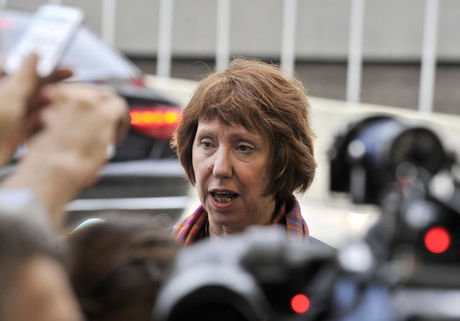EU's Ashton Seeks 'Meaningful' Nuclear Talks with Iran
إقرأ هذا الخبر بالعربية
EU foreign affairs head Catherine Ashton, who leads talks with Tehran on its disputed nuclear program, on Tuesday called on Iran's new president to agree a fresh round of negotiations as soon as possible.
Ashton in a letter offered her congratulations on President Hasan Rowhani's inauguration and said he had won "a strong mandate to engage in dialogue and cooperation with the international community to seek a swift resolution to its serious concerns about Iran's nuclear activities.
"I write to tell you that, together with the (P5+1), I stand ready to continue talks to find a resolution as quickly as possible," a statement quoted her as saying.
"I hope that we can schedule meaningful talks with your negotiating team as soon as practicable," she said.
Ashton serves as lead negotiator with Iran for the P5+1 powers -- the five permanent members of the U.N. Security Council plus Germany.
Her statement came as Rowhani in Tehran said that Iran was ready for "serious" negotiations on its nuclear program with the major powers "without wasting time."
"We are the people of interaction and talks, with seriousness and without wasting time, if the other sides are ready," he told his first news conference since assuming office on Saturday.
Rowhani also hit out at a call by 76 U.S. senators for tougher sanctions, saying their letter to President Barack Obama showed a lack of understanding of Iranian politics.
"We care about the U.S. response in deeds, not in words," he added.
On Monday, Ashton had called on Rowhani to make "rapid progress" towards resolving concerns over Iran's nuclear program.
Western powers believe the Iranian nuclear program is being used to develop an atomic bomb but Tehran insists it is for peaceful purposes.
Ashton met Iran's top nuclear negotiator Saeed Jalili in Istanbul in May for talks he described as "long and useful" after fruitless discussions the previous month in Almaty, Kazakhstan.
U.S. and EU sanctions have crippled Iran's once lucrative oil sector, cut its access to global banking and contributed to soaring inflation and a shrinking economy.



